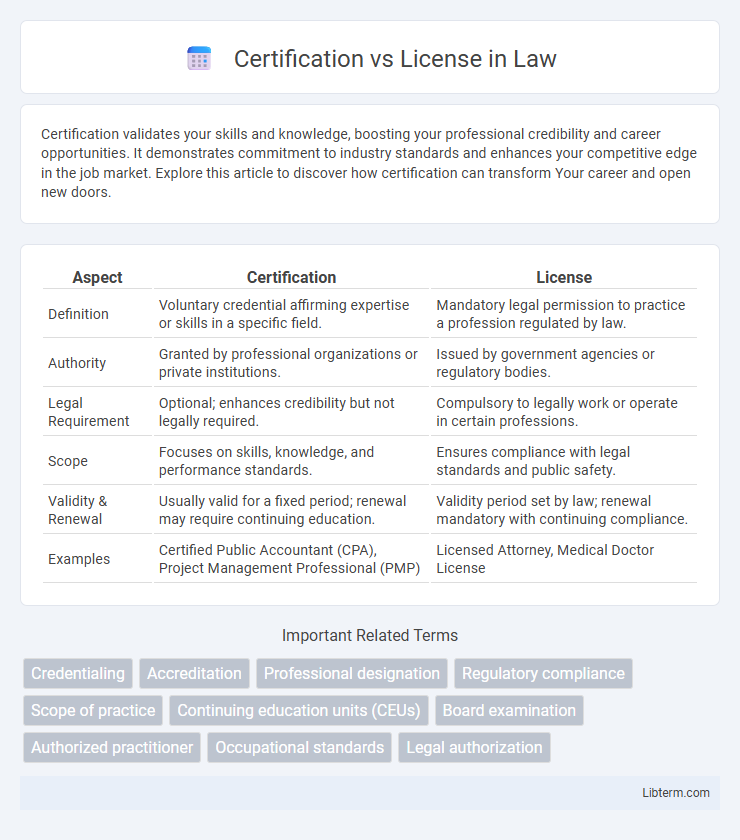Certification validates your skills and knowledge, boosting your professional credibility and career opportunities. It demonstrates commitment to industry standards and enhances your competitive edge in the job market. Explore this article to discover how certification can transform Your career and open new doors.
Table of Comparison
| Aspect | Certification | License |
|---|---|---|
| Definition | Voluntary credential affirming expertise or skills in a specific field. | Mandatory legal permission to practice a profession regulated by law. |
| Authority | Granted by professional organizations or private institutions. | Issued by government agencies or regulatory bodies. |
| Legal Requirement | Optional; enhances credibility but not legally required. | Compulsory to legally work or operate in certain professions. |
| Scope | Focuses on skills, knowledge, and performance standards. | Ensures compliance with legal standards and public safety. |
| Validity & Renewal | Usually valid for a fixed period; renewal may require continuing education. | Validity period set by law; renewal mandatory with continuing compliance. |
| Examples | Certified Public Accountant (CPA), Project Management Professional (PMP) | Licensed Attorney, Medical Doctor License |
Understanding Certifications and Licenses
Certifications validate an individual's expertise and skills in a specific field through rigorous testing or assessment by recognized professional organizations. Licenses are government-issued permits that legally authorize individuals to practice certain professions or trades, often requiring ongoing compliance with regulatory standards. Understanding the distinction between certifications and licenses is crucial for career advancement and legal practice within regulated industries.
Key Differences Between Certifications and Licenses
Certifications are voluntary credentials awarded by professional organizations to validate expertise in a specific skill, while licenses are mandatory permits issued by governmental agencies required to legally perform certain jobs or activities. Certifications often require passing an exam and may need renewal through continuing education, whereas licenses enforce compliance with state or national regulations and involve ongoing monitoring or renewal. The key difference lies in legality: licenses grant legal authority to practice, whereas certifications demonstrate professional competence without legal enforcement.
Purpose and Scope of Certifications
Certifications validate specialized skills and knowledge in a specific field, demonstrating competency beyond formal education, often issued by professional organizations. The purpose of certifications is to enhance career opportunities, increase credibility, and ensure adherence to industry standards across various sectors such as IT, healthcare, and finance. Unlike licenses, which are legally required to practice certain professions and regulated by government authorities, certifications have a broader scope and are generally voluntary, focusing on professional development and expertise recognition.
Purpose and Scope of Licenses
Licenses serve as official authorizations granted by governmental agencies to legally permit individuals or businesses to perform specific activities, ensuring compliance with regulatory standards and public safety. Unlike certifications that validate an individual's skills or knowledge, licenses define the legal scope and boundaries within which one can operate, often requiring renewal and adherence to ongoing criteria. The purpose of licenses is to protect consumers and maintain industry standards by restricting practice to qualified and vetted professionals or entities within a defined jurisdiction.
Industry Requirements: Certification vs License
Certification validates an individual's expertise and skills in a specific industry, often awarded by professional organizations to demonstrate proficiency. Licenses are mandatory legal requirements issued by government agencies, granting permission to practice certain professions or operate businesses within regulated industries. Industry requirements typically mandate licenses for compliance and adherence to safety standards, while certifications enhance credibility and career advancement opportunities.
Legal Implications and Compliance
Certification demonstrates a professional's expertise and commitment to industry standards, often granted by private organizations, and typically does not confer legal authority to practice. Licenses are mandatory legal approvals issued by government agencies that permit individuals to perform regulated activities, ensuring compliance with state laws and protecting public safety. Failure to obtain or maintain proper licensure can result in penalties, fines, or legal action, highlighting the critical role of licenses in legal compliance.
Career Impact and Advancement Opportunities
Certification validates specialized skills and knowledge in a particular profession, often enhancing credibility and competitive advantage in the job market. Licenses are legally required credentials that permit individuals to practice certain professions, ensuring compliance with regulatory standards and enabling entry into regulated fields. Holding relevant certifications and licenses significantly boosts career advancement opportunities by demonstrating both expertise and regulatory adherence, attracting employers and qualifying individuals for higher-level positions.
Renewal and Maintenance Processes
Certification requires periodic renewal often through continuing education credits or retesting to maintain professional competency and relevance. Licenses typically mandate strict renewal intervals enforced by government agencies, necessitating proof of practice hours or compliance with updated regulations. Both processes ensure ongoing adherence to industry standards but differ in regulatory authority and renewal complexity.
Costs and Time Investment
Certification processes generally require a lower financial investment, often ranging from $100 to $500, and can be completed within a few weeks or months depending on the program. Licensing typically involves higher fees, sometimes exceeding $1,000, along with comprehensive background checks, exams, and fulfillment of experience requirements that may take several months to years. Time investment for certification emphasizes skill validation and ongoing education, whereas licensing demands adherence to state or regulatory body mandates, including renewals and continuing professional development.
Choosing the Right Path: Certification or License
Choosing the right path between certification and license depends on career goals, industry requirements, and legal regulations. Licenses are mandatory credentials issued by government agencies to authorize specific professions, ensuring compliance with laws and safety standards. Certifications are voluntary credentials granted by professional organizations to validate expertise and skills, enhancing employability and professional growth.
Certification Infographic

 libterm.com
libterm.com